Contents
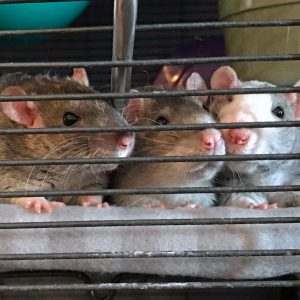
Have you ever wondered what your rat was thinking or wished they could speak? Unlike cats and dogs, rats aren’t nearly as vocal — to the human ear anyway — but they do have distinctive ways of communicating with their owners. Body language, physical actions, and some key sounds are all a part of the rat communication repertoire, and it’s up to us to decode them.
Know The Basics Of Rat Noises
What sound does a rat make? Movies and TV have this annoying habit of adding in unrealistic squeaky noises anytime a rat appears on screen. I have yet to ever hear my rats make a similar sound. Rats don’t really have the equivalent to a bark, meow, or moo. This doesn’t mean they are without sound; they just tend to vocalize less often at a human-audible level than other pets. Rats rely more on body language. Rats also use a series of ultrasonic sounds to communicate with one another.
That said, some rats are more audibly “talkative” than others. My boy Camden has a tendency to let out one squeak for the most random reasons. I used to think he was in pain, but I finally realized that Camden was just a talker. It’s his unique personality quirk.
Review Of The Rat Vocabulary
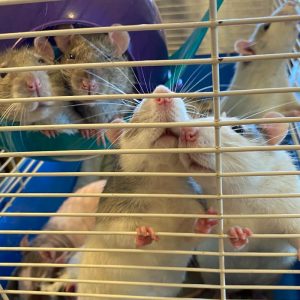
On the rare occasions that your rat does “speak,” it will most likely be a small peep, a hiss, a squeak, a squeal, or a screech of protest. Not all, but many of these sounds can convey a complaint of some kind or a negative emotion, whether it be irritation, anger, pain, or fear.
If squeaks or squeals are being directed at you, then you are definitely being yelled at. Sometimes this is just unavoidable. A bath for instance, is likely to be met with an array of different, disgruntled sounds, even if the water is at a perfect temperature. As long as you’re sure no harm is being done, then try comforting your sweetie with a soothing voice and get through the process as quickly as possible.
An abrupt, loud squeak when picking up a rat or during an activity, like nail trimming, could mean your rat is in pain. Stop what you’re doing and see what’s wrong. If at any time you hear frantic screeching, take immediate action to see what is happening! A fight, an injury, or a predator are among many potential life-threatening possibilities to cause a sound like that.
Communicating With Other Noises
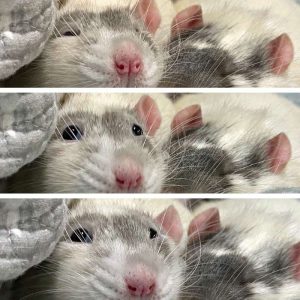
Most of the time rats are content enough to spend time in their cage, provided they have plenty of space, places to hide, and things to keep them busy. If you notice your rats frantically chewing at the bars or trying to dig out, then they are most likely suffering from boredom or anxiety. In this case, reevaluate and make any necessary changes to their habitat. In addition, offer them ways to get plenty of exercise, and set aside 1 to 2 hours a day for quality-time together.
Quality time can lead to one of the best forms of rat communication: bruxing and boggling! Bruxing is the sound made when rats grind their incisors together. This keeps the incisors at a proper length and sharpened, but it can also identify your rat’s mood. While bruxing can happen when a rat feels stress, it most often occurs when a rat feels safe and truly content. Think of a cat purring. Boggling might follow during intense moments of bruxing. Boggling causes the rat’s eyes to vibrate in and out of the head from the jaw contracting. It’s as alien looking as it sounds and is by far one of the strangest things rats can do — but also one of the coolest! Unfortunately, not all rats brux or boggle. But don’t take that to mean your rat isn’t happy; he or she just may not express happiness that way.
Watch That Body Language
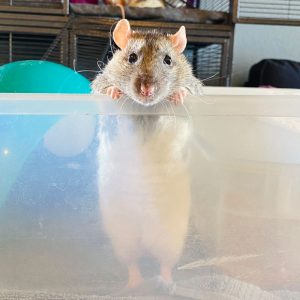
The more time you spend with your rats, the more you’ll notice all the silent ways they speak to you.
Dogs have “puppy eyes,” but rats are just as gifted at looking pitiful to get your attention. You’ve probably noticed your rats hovering at the cage door, staring at you with pleading eyes. Whether they are begging to be fed, let out to play, or looking for a snuggle, this is a sure sign they want your attention.
If your rat stands up on their back legs and reaches out for you, grabs at your shirt or hair, or looks like they are about to jump toward you, this means they want to be held. Or at least use you as transportation somewhere.
Younger rats often do a happy hop and jump, also known as “popcorning.” This means they are a in a good mood and want to play. In this playful moment a rat might also enjoy chasing and wrestling with their human’s fingers or being tickled. Don’t be startled if they put their teeth on you; they’re just being frisky, not attacking. To ensure this doesn’t become a painful habit into adulthood, say “gentle” and encourage a different game if this happens.
How Urine Talks
It’s not uncommon for rats, males in particular, to leave little dribbles of pee after walking on you. This is known as marking. Many people believe this is a rat’s way of claiming you as their territory or property. Their urine does provide a ton of information to themselves and other rats, but according to RatBehavior.com and the studies it lists, the notion of ownership is up for debate. It’s difficult to find solid research on why domesticated rats specifically do this to humans, but both wild and tame rats mark other rats in their mischief/group. So perhaps our pets consider us a part of their group, too. They are also known to mark new environments and objects, which might explain why rats are more prone to marking their owners soon after being adopted, then lessen this habit over time. From my own personal experience, it seems rats are more likely to mark you when they aren’t feeling frightened or nervous. This means that dribble of pee down your arm was left by a rat that felt comfortable with you. Now, don’t you feel loved?
Learn The Language Of Grooming
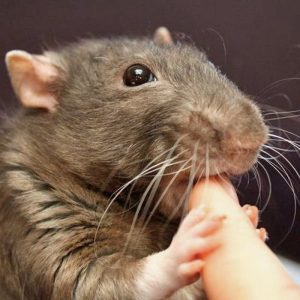
If you ever find your rat trying to pry open your mouth, only to shove their head in to inspect and clean your teeth, don’t freak out! Yes, it’s super weird, but it means you have a “rodentist,” a rat who truly trusts you enough to see what you’ve had to eat. It’s very common for rats to inspect their cagemates’ mouth in the same way.
Grooming is a huge part of rat life. They repeatedly spend time throughout their day preening themselves and their friends, so it’s no surprise that they do it to their owners as well. Sometimes this is to taste you or the things you’ve touched. But sometimes it’s because they see you as one of them. This behavior of affection can sometimes be a little painful, especially if they try cleaning sensitive areas, like your eyelids, or they use too much teeth. But it can also be very gentle and even ticklish! Just be thankful they don’t have dog breath.
There’s a whole world of different behaviors just waiting for you to explore with your rat.





“This means that dribble of pee down your arm was left by a rat that felt comfortable with you. Now, don’t you feel loved?” LOL Absolutely!
Interestingly, after having small human children, all of our ratties have been very vocal! They learned very quickly, that having a voice gets the small humans to react and adult human’s attention much faster!
Thanks very much for this great article!
Remember, if you love animals, please don’t eat them <3
That was an amazing article!!
I’m continually amazed at how rats learn to interact with different owners. I love that yours learned vocalization gets them more attention in your house; too funny!
I’m a rat breeder for pet and show ,a d they are just the best They are so smart and they show empathy
And they definitely have many ways to let you know what they want or don’t want 😜
I have even trained done to alert me to an oncoming migraine (he was never wrong ) he would vocalize almost like a guinea pig it was so sweet.❤️